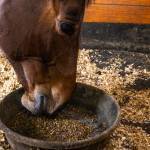Question
I own a yearling Hanoverian filly that weighs 800 lb (365 kg) and is in moderate body condition. She’s fed unlimited orchardgrass hay and 3 lb (1.4 kg) of growth feed. She has access to pasture in the spring, summer, and fall, and a salt block year-round. She spends much of her time outside. The filly looks good, but I want to make sure this ration won’t encourage development of OCD. What are your thoughts?
Answer
The type of feed you are currently offering your filly is acceptable for her at this time. For her size and age, however, she should be eating at least the minimum amount recommended by the manufacturer, which in this case is 6 lb (2.7 kg). This amount, and no less, will provide her with the fortification she requires for proper growth and overall well-being.
Increasing her feed may result in unnecessary weight gain, which is not ideal for immature joints. If her current growth is steady and she is maintaining moderate body condition, I don’t suggest increasing the feed at this time. Instead, add a ration balancer pellet, a concentrated source of protein, vitamins, and minerals. A ration balancer is perfect for horses that don’t require as much intake to maintain their body weight. Most ration balancers are designed to be fed at 1-2 lb (0.45-0.9 kg) per day. Review the specific feeding instructions on the product you choose for accurate feeding recommendations.
Another suggestion for proper bone development and anti-inflammatory benefits is a marine-derived source of omega-3 fatty acids. EO•3 fish oil is a rich source of DHA and EPA, two omega-3 fatty acids that have been shown to reduce the inflammatory response throughout the body, including joint inflammation.
Nutrition is only one factor thought to be involved in the development of osteochondritis dissecans (OCD) lesions. Some young horses have a genetic predisposition to the disorder. Other times, a traumatic injury might be responsible for disease onset. In still other cases, more than one factor might be to blame. Supplying nutrients in proper amounts is one step in keeping young horses from developing OCD lesions.








